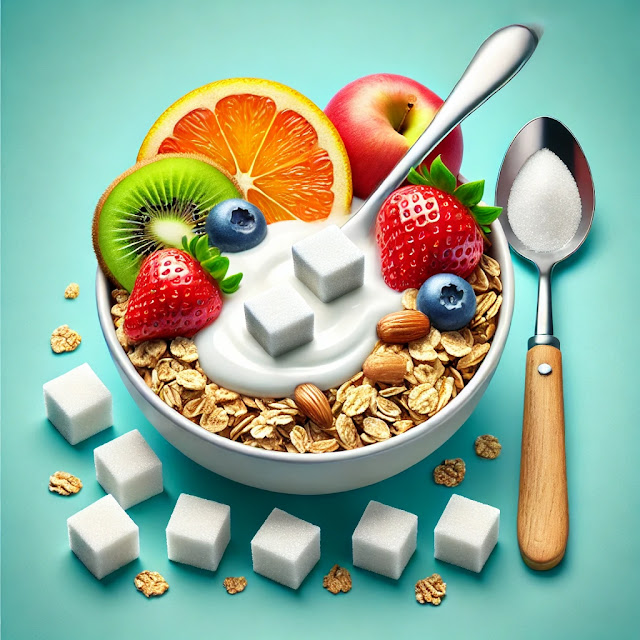Many people strive to eat healthier by choosing foods labeled as "healthy" or "natural." However, not all foods that appear nutritious are actually good for you. In fact, some commonly marketed "health foods" can be misleading, causing more harm than good. In this article, we’ll uncover some of the most deceptive "healthy" foods that may negatively impact your diet and overall health.
1. Granola
Granola is often marketed as a wholesome breakfast option packed with fiber, nuts, and dried fruits. However, most store-bought granola brands are loaded with sugar, unhealthy oils, and preservatives. A single serving can contain as much sugar as a candy bar, leading to spikes in blood sugar and potential weight gain. If you love granola, opt for homemade versions using natural ingredients like unsweetened oats, nuts, and a small amount of honey or maple syrup.
2. Flavored Yogurt
Yogurt is known for its probiotics and protein content, making it a popular choice for a healthy diet. However, flavored yogurts often contain high amounts of sugar and artificial additives. Some brands have more sugar per serving than a can of soda! Instead, choose plain Greek yogurt and add fresh fruits or a drizzle of honey for natural sweetness.
3. Fruit Juice
Many people believe fruit juice is a healthier alternative to soda. However, most commercial fruit juices are high in sugar and lack the fiber found in whole fruits. Even 100% fruit juice can cause rapid spikes in blood sugar, leading to energy crashes and increased cravings. A better choice is to eat whole fruits or make smoothies with fiber-rich ingredients like chia seeds or leafy greens.
4. Protein Bars
Protein bars are often marketed as a convenient post-workout snack or meal replacement. However, many of these bars contain excessive sugar, artificial sweeteners, and unhealthy fats. Some are no better than candy bars in terms of nutritional value. If you need a protein boost, consider natural sources like nuts, seeds, eggs, or lean meats.
5. Diet Sodas and Artificial Sweeteners
Many people switch to diet sodas to reduce sugar intake, but these drinks contain artificial sweeteners that may have negative health effects. Some studies suggest that artificial sweeteners can disrupt gut bacteria, increase cravings for sugary foods, and potentially lead to metabolic disorders. Water, herbal teas, or naturally flavored sparkling water are healthier alternatives.
6. Multigrain and Whole Wheat Bread
Not all "whole wheat" or "multigrain" breads are created equal. Many commercial breads labeled as "multigrain" still contain refined flours, added sugars, and preservatives. If you want a healthier choice, look for bread that lists "100% whole grain" as the first ingredient or consider sprouted grain bread for better nutrient absorption.
7. Fat-Free and Low-Fat Products
While cutting fat might seem like a good idea, many "fat-free" or "low-fat" products compensate by adding sugar, salt, or artificial ingredients to enhance flavor. Healthy fats from sources like avocados, nuts, and olive oil are essential for brain function, hormone production, and overall health. Instead of fearing fat, focus on incorporating good fats into your diet.
8. Sports Drinks
Sports drinks are marketed as hydration boosters for athletes, but they often contain excessive sugar, artificial flavors, and dyes. Unless you’re engaging in prolonged intense exercise, plain water or coconut water is a better choice for hydration.
9. Smoothies and Acai Bowls
While smoothies and acai bowls can be packed with vitamins and antioxidants, they can also be loaded with sugar from fruit juices, sweetened yogurts, and granola toppings. When buying or making a smoothie, use whole fruits, leafy greens, unsweetened almond milk, and protein sources like chia seeds or plain Greek yogurt.
10. Gluten-Free Packaged Foods
Gluten-free does not always mean healthier. Many gluten-free packaged foods contain refined grains, added sugars, and unhealthy oils. If you don’t have celiac disease or gluten sensitivity, whole grains like quinoa, brown rice, and oats can be more nutritious choices.
11. Vegetable Chips
Vegetable chips might seem like a better alternative to regular potato chips, but many brands are still deep-fried, high in sodium, and made with processed vegetable powders rather than real whole vegetables. For a healthier snack, try air-popped popcorn, raw veggie sticks, or baked kale chips.
12. Instant Oatmeal
Oatmeal is a great source of fiber, but flavored instant oatmeal packets often contain added sugars and artificial flavors. Instead, go for plain rolled or steel-cut oats and sweeten them naturally with fruits, cinnamon, or a drizzle of honey.
13. Salad Dressings
Many store-bought salad dressings contain unhealthy fats, added sugars, and preservatives. Even "light" or "fat-free" dressings can be loaded with artificial ingredients. Making your own dressing using olive oil, lemon juice, vinegar, and herbs is a healthier and tastier option.
14. Sushi Rolls
Sushi is often perceived as a healthy meal, but certain rolls contain excessive white rice, fried ingredients, and high-calorie sauces. Opt for sashimi, rolls with brown rice, or those with more veggies and lean proteins.
15. Cereal
Many cereals labeled as "healthy" or "whole grain" contain large amounts of sugar and refined grains. Even options that claim to be "high in fiber" may have hidden additives. Choose cereals with minimal ingredients, high fiber content, and low sugar, or go for homemade oatmeal.
Conclusion
Just because a food is marketed as "healthy" doesn’t mean it truly benefits your body. Many processed health foods contain hidden sugars, unhealthy fats, and artificial additives that can do more harm than good. The best approach is to read ingredient labels, choose whole and minimally processed foods, and prepare your own meals whenever possible. By making informed choices, you can maintain a genuinely healthy diet and avoid the pitfalls of misleading "health" foods.
